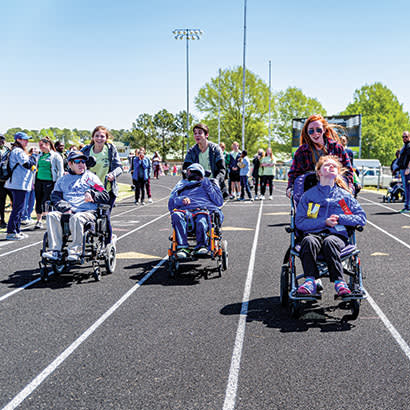
It’s been two years since the official launch of NRPA’s Parks for Inclusion initiative in September 2017. And now, more than ever, NRPA is dedicated to our mission that everyone, no matter race, ethnicity, income level, sexual orientation, gender identity, religion or age, has access to quality park and recreation facilities and programs that meet their health and environmental needs. Through Parks for Inclusion, NRPA has accomplished a lot over the past two years, including highlighting success stories from the field, developing model inclusion policy guidance, and sharing best practices for program implementation to increase access to health and environmental benefits for our target populations:
- Those with physical and cognitive disabilities
- The LGBTQ+ community
- Racial and ethnic minorities
- Immigrants and refugees
Facing Health Disparities
In the United States, significant health disparities exist for these target populations. Racial and ethnic minorities more commonly face obstacles to health and quality of life, such as poverty, lack of access to good jobs with fair pay, quality education, housing and healthcare. Systemic practices and policies that unfairly discriminate against people of color have contributed to poorer economic and health outcomes for racial and ethnic minorities. People of color are more likely to have chronic diseases, such as obesity, cardiovascular disease, diabetes and poorer mental health.
Research has shown that those with physical and cognitive disabilities have significantly higher prevalence rates for most chronic diseases, including cardiovascular disease, diabetes, asthma, high blood pressure and high cholesterol. People with disabilities also consistently report higher rates of obesity and smoking, and a lack of physical activity and outdoor connection.
In the LGBTQ+ community, research shows that the lack of physical and social activity opportunities contributes to health disparities linked to social stigma, discrimination and denial of civil and human rights. Social discrimination against the LGBTQ+ community has been associated with high rates of psychiatric disorders, substance abuse, suicide and obesity.
Immigrants and refugees report experiencing intense feelings of loss after leaving their native country and may even go through a period of cultural bereavement and distress. In addition, refugees and immigrants face barriers around job opportunities, housing, healthcare and language, making it difficult to acclimate to a new culture and life.
At the beginning of this initiative, NRPA surveyed park and recreation professionals to gauge where agencies stood in relation to inclusive practices. The survey asked what was being offered in terms of inclusive access to recreational facilities, programs serving a variety of community members and where there were gaps. Nearly 500 agencies responded to the survey, which identified that while there are many positive trends around inclusion in parks and recreation, there is significant room to grow. In addition, agencies identified shared challenges around funding, staffing, facility space shortages, and a lack of staff training.
Responding Through Resources
In response to these needs, NRPA created the Parks for Inclusion online database to house resources that support inclusive practices in park and recreation agencies and within facilities. These resources, developed by NRPA, partner organizations and leaders in the field, include toolkits, assessments, online tools and case studies. For example, you’ll find Parks for Inclusion one-pagers, which are quick fact sheets about the challenges historically marginalized audiences face, how this impacts their wellbeing, and what park and rec agencies can do to promote positive health outcomes.
One of the biggest needs identified in the survey was a gap in the number of park and recreation agencies that have formal inclusion policies. NRPA developed the Parks for Inclusion Best Practice Guide to Developing an Inclusive Policy to address this gap. This guide and supplemental resources were designed to help agencies create and implement inclusive policies in local parks and recreation. It highlights why inclusion in parks and recreation matters, why it’s important to have a policy in place and how to engage staff and the community in developing a policy.
As NRPA moves into the final year of this three-year initiative, we will continue to act on our mission of ensuring that everyone has access to the benefits of parks and recreation through resource development, funding opportunities and chances to network with park and recreation peers to share best practices. If you are interested in sharing your agency’s inclusion policy, send a copy to Maureen Acquino.
Maureen Acquino is an NRPA Health and Wellness Program Manager.

